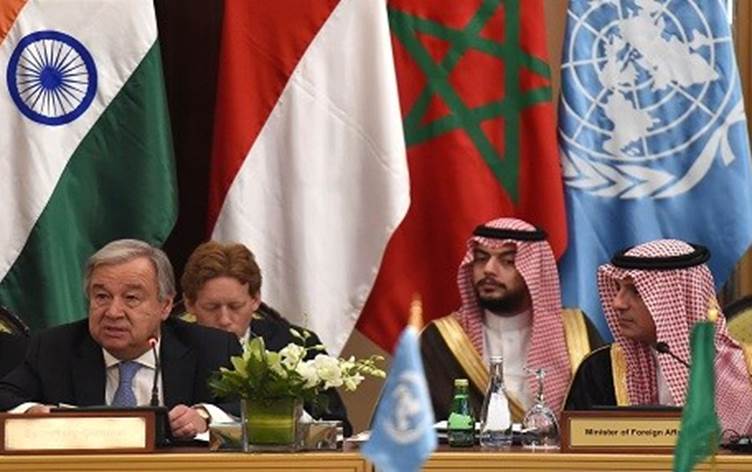ERBIL, Kurdistan Region — Saudi Arabian Foreign Minister Adel al-Jubeir expressed the willingness of his Kingdom to send troops to eastern Syria in areas where US-led international anti-ISIS coalition members operate.
“We have been in talks with the United States since the onset of the crisis. Concerning sending forces to Syria, we gave the Obama administration a suggestion that if the United States sends forces, then the KSA will also contemplate sending troops within that coalition alongside other countries. This is not a new idea,” said Jubeir in a joint press conference with the UN secretary general in Riyadh on Tuesday.
Secretary-General Antonio Guterres was in Saudi Arabia to attend a meeting at UN's counterterrorism center in Riyadh, where he met with King Salman in addition to Jubeir.
Guterres said only a political solution could resolve the situation in Syria.
Jubeir recounted that the Kingdom was a complete partner to the United States in the Kuwait war in 1990 in and the subsequent no-fly zone over Iraq.
The Foreign Minister also pointed out to KSA’s role in fighting terrorism, saying it is playing an active role in the fight against ISIS alongside the United States and its coalition.
Jubeir reiterated that they have always met their “financial obligations.” In May 2017, Riyadh agreed to a $350 billion arms deal with Washington — the largest in US history.
Trump wants regional Arab countries in Syria
US President Donald Trump has said he wants US troops out of Syria and his administration reaching out to regional Arab partners and allies to fill what would be a void.
"We'll be coming out of Syria, like very soon," he said on March 29. "Let the other people take care of it now."
French President Macron announced that he had convinced Trump to stay in Syria.
Eastern Syria is controlled by the US-backed Syrian Democratic Forces, the bulwark formed by the mostly-Kurdish People’s Protection Units (YPG).
The US president's new national security adviser, John Bolton, has reached out to other Arab states, namely Saudi Arabia’s ally Egypt, to contribute troops for an Arab force in parts of Syria where the United States now has a presence, the Wall Street Journal reported citing an unnamed US official.
Other reports claim Trump also wants Qatar and Jordan to contribute forces to resolving the Syrian conflict.
Bolton is an outspoken critic of Iran. There have been concerns of a Shiite bridge or crescent, and many have advised Trump against leaving the area.
Turkey on its own has threatened to invade the Kurdish administered areas of northern Syria, also called Rojava.
The countries, except for Qatar, also have issues with Turkey, which has established a military base in Qatar in spite of Saudi complaints.
There are about 2,000 US forces in Syria.
“I want to get out. I want to bring our troops back home,” Trump has said.
Saudi Crown Prince Mohammed bin Salman said after Trump’s announcement that the Americans should remain in Syria.
UN Special Envoy for Syria Staffan de Mistura attended a meeting of Foreign Ministers and the Summit of the League of Arab States last week, when he spoke with all the attending regional Arab players including from Iraq.
The intensive high-level consultations have “the aim of proactively ascertaining the options for a meaningful re-launch of the UN-facilitated political process as called for in Security Council resolution 2254 (2015),” according Mistura’s office on Wednesday.
Mistura is in Ankara on Wednesday, and then will go to Moscow and Tehran in the coming days. After consulting with the United States and attending the Brussels Conference at the end of the month, Mistura will brief Guterres.



Comments
Rudaw moderates all comments submitted on our website. We welcome comments which are relevant to the article and encourage further discussion about the issues that matter to you. We also welcome constructive criticism about Rudaw.
To be approved for publication, however, your comments must meet our community guidelines.
We will not tolerate the following: profanity, threats, personal attacks, vulgarity, abuse (such as sexism, racism, homophobia or xenophobia), or commercial or personal promotion.
Comments that do not meet our guidelines will be rejected. Comments are not edited – they are either approved or rejected.
Post a comment